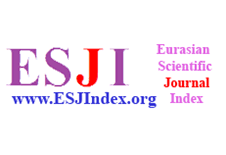ASSESSMENT OF SERUM ZINC AND ALBUMIN LEVELS AMONG NEWLY
Nuha Eljaili Abubaker
Head Department of Clinical Chemistry, College of Medical Laboratory Science, Sudan University of Science and Technology, Khartoum, Sudan
Hassan Siddig AbdElgader Omar
Department of Microbiology, College of Medical Laboratory Science, Sudan University of Science and Technology, Khartoum, Sudan
Hind Haidar Ahmed
College of Medical Laboratory Science, AL-Neelin University of Science and Technology, Khartoum, Sudan
##semicolon## Pulmonary tuberculosis patients, Zink level, Albumin level
सार
Background: Tuberculosis is a major public health problem world-wide, it is contagious disease caused by organism mycobacterium tuberculosis. The aim of this study was to assess the level of zinc and albumin in newly diagnosed patients with pulmonary tuberculosis in Khartoum state.
Methods: Fifty blood samples were collected from newly diagnosed pulmonary tuberculosis patients during the period between April to May 2017, chosen randomly from Abu Anga Teaching Hospital and fifty blood samples from apparently healthy individuals serve as control group. Estimation of serum albumin level was performed using spectrophotometer and estimation of serum zinc by using flame atomic absorption spectrophotometer. The results were analyzed by using (SPSS) computer program.
Results: The study showed that, serum level of zinc and albumin were significantly decrease inpatients compared to control group (mean± SD for cases versus control).
For zinc :( 0.16±0.05 versus 0.58± 0.13 mg/l, P. value= 0.000). For albumin: (2.5±0.58 versus 4.1±0.31g/dl, P. value= 0.000). The result of this study showed that, there was statically significant decrease in the mean of BMI inpatients compared to control group. Mean ±SD for case versus control (18.7±0.17 versus 21.5±1.7). The result of this study showed that, pulmonary tuberculosis most common among age between (20-39) years (52%) and (48%) of patients between age (40-58) years and this disease most abundant in males (78%) than females (22%). Persons correlation showed that there was no correlation between serum zinc level and age (r =-0.128, p. value=0.374) also there was no correlation between the level of serum albumin and age (r=0.137, p. value =0.344).
Conclusion: The serum levels of zinc and albumin were significantly decreased in newly diagnosed patients with pulmonary tuberculosis in Khartoum state.
##submission.citations##
Bhandari, S., Badade, Z.G., Neupane, Y. Role of Micronutrient Zinc in Pulmonary Tuberculosis. Journal of Universal College of Medical Sciences. 2013; 15: 1-3.
Organization WHO. Tuberculosis. Saudi Med Journal.2013; 34:1205- 1207.
Organization WHO. The Global Tuberculosis Control . WHO Journal.2016; 4:437-439.
Doyin, O., Sambe, D., Justin, O., Winston, W.,Stephen, M., Silvio, W.Nutrition and tuberculosis: a review of the literature and consideration for TB control programs. Global tuberculosis control: WHO report. 2007; 376.
Doyin, O., Sambe, D., Justin, O., Winston, W., Stephen, M., Silvio, W. Nutrition and tuberculosis: a review of the literature and consideration for TB control programs.
Global tuberculosis control: WHO report; 2005.
Doyin,O., Sambe, D., Justin, O., Winston, W.,Stephen, M., Silvio, W.Nutrition and tuberculosis: a review of the literature and consideration for TB control programs. Global tuberculosis control: WHO report ; 2006.
Davies, P.D. The worldwide increase in tuberculosis: how demographic changes, HIV infection and increasing numbers in poverty are increasing tuberculosis. Ann Med.2003; 35(4):235-243.
Corbett, E.L., Watt, C.J., Walker, N. The growing burden of tuberculosis: global trends and interactions with the HIV epidemic. Arch Intern Med. 2003; 163(9):1009- 1021.
Cegielski, J.P., McMurray, D.N. The relationship between malnutrition and tuberculosis: evidence from studies in humans and experimental animals; InternationalJournalTuberculosis andLungDisease. 1994; 8(3):286-298.
Gupta, K.P., Gupta, R., Atreja, A. Tuberculosisand nutrition. LungIndia.2009; 26(1):9- 16.
Walker, C.F., Black, R.E. Zinc and the risk for infectious disease. Annu Rev Nutr.2004; 24:255-275.

















